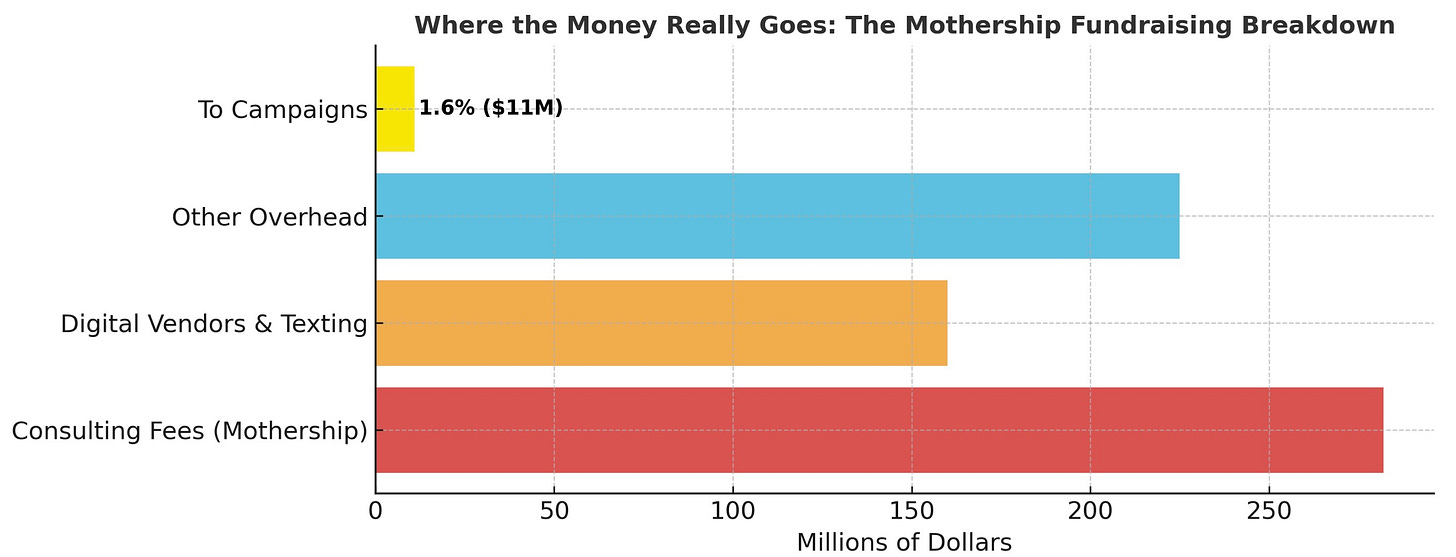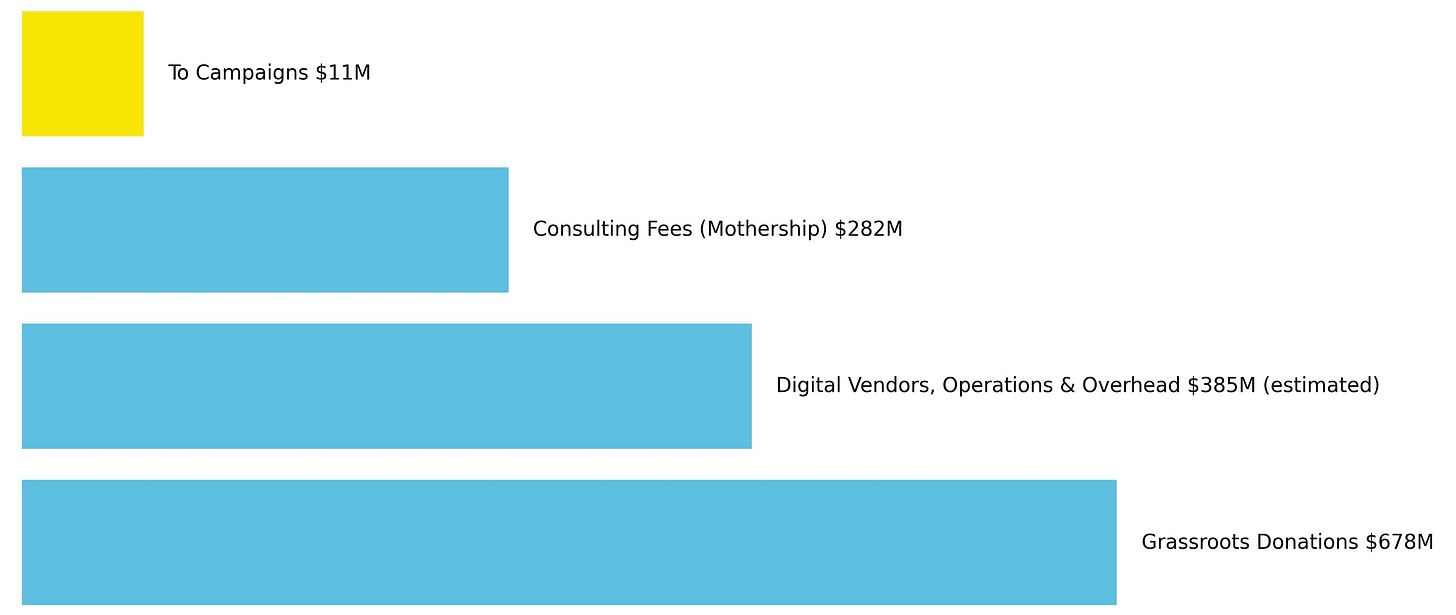How “Saving Democracy” Became a $282 Million Political Fundraising Scam
The truth about where your political donations go — and how both parties let it happen.
⏱️ 4.5 min read
Listening to a Podcast I Was Blown Away By What I Learned
Every election cycle, we’re told that democracy is on the line — that one more small donation will make all the difference. Millions of Americans respond, believing they’re funding candidates and causes they care about. But what if the real winners in this process aren’t the candidates or voters?
I was listening recently to Chuck Todd’s podcast, where he interviewed Adam Bonica, a university professor who has spent years dissecting the mechanics of political fundraising. Bonica writes a sharp, data-driven Substack called Data for Democracy, and what he’s uncovered about how money actually moves through our political system is deeply unsettling.
One of his recent pieces dives into the left’s mass email fundraising machine. I’ve tried here to summarize his findings in one plain-spoken column. I wanted to talk about this because what he describes is a pretty grotesque look into a massive political fundraising apparatus that effectively gets people to make donations, but the donors have no clue how little of their contributions are getting to the intended candidates or causes.
A Fundraising Empire Built on Emotion and Deception
You’ve seen the messages: “We’re falling short!” “Chip in $10 to save democracy!” Bonica’s analysis centers on a Washington consulting shop called Mothership Strategies. This firm has turned political panic into a business model, soaking small donors who believe their contributions go directly to campaigns. Mothership is an entrenched part of a liberal fundraising machine.
Since 2018, Mothership and a cluster of PACs tied to it have raised roughly $678 million. About $159 million flowed from those PACs back to Mothership, and $282 million went to the firm from every client on its roster. When the dust settled, only 1.6 percent of what was raised reached candidates or committees.
It’s staggering.
From Party Insiders to Digital Middlemen
Mothership was founded by Greg Berlin and Charles Starnes, two veterans of the Democratic Congressional Campaign Committee. They left the DCCC with its digital playbook — panic, deadlines, guilt — and built a business around it.
The result is a web of PACs with populist names such as Stop Republicans, Progressive Turnout Project, and End Citizens United. They look like independent grassroots outfits but feed the same revenue stream.
The Numbers Don’t Lie
According to Bonica’s research Federal filings show Mothership collected $282 million in fees, and another $22.5 million went to a texting vendor that pushes out the avalanche of “Last Chance!” appeals. The system is designed to pay the operators first, vendors second, and campaigns — if anything’s left — last.
After salaries, ad buys, and “digital infrastructure,” just $11 million of the $678 million raised went to actual campaigns. For every dollar a retiree sends to “protect democracy,” ninety-eight cents go to overhead.
Why No One Stops It
There is no doubt that everyone in Democratic Party leadership knows this happens. Yet the firm still works for major Democratic-aligned groups such as House Majority PAC and for establishment-backed candidates. The relationship persists because it serves both sides: consultants get rich, the party receives money, and a fresh donor list.
Each manipulative subject line — “We’re begging you — chip in before midnight!” — erodes trust. The party that lectures about transparency is running a digital shell game.
A Mirror for Both Parties
And conservatives shouldn’t gloat. The Republican world has its own consultant economy built on small-donor manipulation. Just like a bunch of money from liberal donors isn’t getting to liberal candidates, the same is going on with Republicans, no doubt.
ProPublica detailed a GOP fundraiser who pleaded guilty after the PACs he ran pulled in nearly $10 million and sent just $48,400 to real campaigns. Republicans have also run the same emotional plays — pre-checked recurring donation boxes, guilt-driven appeals, and even the NRCC’s now-infamous “DEFECTOR” checkbox (this was were they provided, per the law, a box to check if you did not want to have automatic deductions for donations — and they proceeded to put on message attacking anyone who would have the nerve to check the box.
So, Does It Matter?
It matters a lot. When political professionals pocket hundreds of millions raised in the name of civic virtue, they’re not only betraying donors — they’re poisoning faith in the system itself. Outrage has become a business model, and idealism the raw material. If a corporation misled customers this way, prosecutors would line up. In politics, it’s treated as a strategy.
This isn’t just financial misconduct — it’s moral fraud. Millions of well-meaning citizens on both sides believe they support candidates and causes they care about. They’re not. They’re fueling a self-enriching machine that makes sure that the consultant class makes a ton of money, and in the meantime the candidate’s campaign is getting only a fraction of what has been contributed by a well-meaning donor.
It’s atrocious. It’s nauseating. And it’s happening every day. Both parties need to clean house. If Democrats actually believe in democracy, they’ll start with this racket. If Republicans care about honesty, they’ll police their own. And if neither does, voters have every right to demand it — loudly. Because when ninety-eight cents of every donated dollar disappears into the “Mothership,” the only thing being saved is the consultants’ lifestyle.





